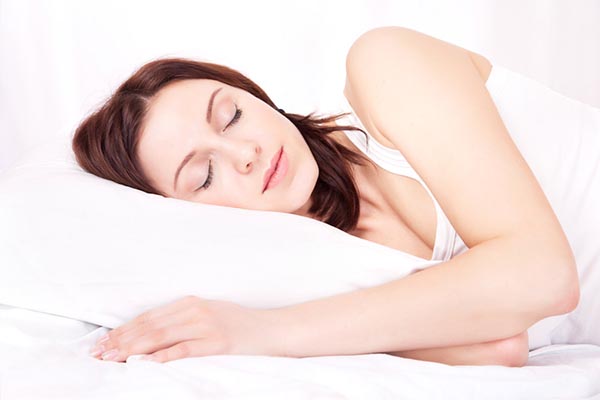Sleep Disorders in Women
Learn the Secrets of a Well-rested Woman
 Whether it’s from stress, lifestyle, hormonal changes or even a snoring spouse, women – especially those in their reproductive years – face a host of particular challenges with getting a good night’s sleep.
Whether it’s from stress, lifestyle, hormonal changes or even a snoring spouse, women – especially those in their reproductive years – face a host of particular challenges with getting a good night’s sleep.
That’s why it’s important for women like you to be aware of the types, risk factors and treatments for common sleep disorders.
Causes
For many women, sleep health is affected by normal life events, such as the onset of menstruation, pregnancy and menopause. As a result of hormonal fluctuations and physical changes, all three phases of a woman’s life can cause nighttime discomfort and insomnia.
Other causes include...
-
Juggling Roles: These days, women are busier than ever. Women who balance multiple roles such as work, parenthood and elder care can find that their sleep patterns are erratic and their sleep quality is compromised by hectic schedules.
- Substances: The use of caffeine, alcohol and nicotine—all three of which act as stimulants—can disrupt sleep. While alcohol is technically considered a depressant and drinking can speed the onset of sleep, women who drink tend to wake up in the middle of the night as their bodies metabolize the alcohol.
- Work and Lifestyle: Shift work is a major cause of sleep-related accidents and illnesses. Many women who work nights and rotating shifts sleep less, which can result in irregular menstrual cycles, fertility problems and higher rates of miscarriage. While exercise, in general, is good for sleep, exercising at night can contribute to sleeplessness.
- Depression and Anxiety: Anyone who’s been up at night worrying knows that mood has a profound impact on sleep. Depression can lead to lethargy or insomnia. Women, in general, are more likely than men to develop depression, and hormonal changes throughout the life cycle can exacerbate the problem. Anxiety, which often occurs alongside depression, is in itself a major cause of sleeplessness. Making matters more complicated, sleep problems can be the cause of depression and anxiety and in some cases, it can be difficult to determine which came first.
- Pain: Chronic pain—anything from migraines to rheumatic arthritis to heartburn—is common among women and can make it hard to fall or stay asleep. In 2000, one in four women reported that pain or physical discomfort interrupted their sleep at least three nights a week.
Top Sleep Conditions Affecting Women
Women experience all of the same sleep problems men do, but their specific biological makeup, hormonal changes and special health concerns like pregnancy impact just how (and how chronically) these conditions affect them.
- Insomnia: Short and poor quality sleep that affects your functioning during the day.
- Narcolepsy: A chronic disorder of the central nervous system characterized by the brain's inability to control sleep-wake cycles.
- Nocturnal Sleep-Related Eating Disorder (NS-RED): An uncommon condition, NS-RED causes sufferers to eat during the night while they appear asleep—and in the morning they have no memory of this behavior.
- Periodic Limb Movement Disorder (PLMD): Simple, repetitive, uncontrollable and often imperceptive muscle movements that occur while your body is at rest.
- Restless Legs Syndrome (RLS): A condition in which your legs feel very uncomfortable when you're sitting or lying down.
- Sleep Apnea: A serious, potentially life-threatening condition that is far more common than generally understood.
Self Care
- Improving Sleep Hygiene: Before you see a doctor, there are many techniques for self-treatment that you can try at home to enhance the quality and duration of your sleep.
- Diet: Try not to eat large or spicy meals close to bedtime and avoid caffeine (that includes chocolate) at night.
- Exercise: Any kind of physical activity can promote sleep. Try vigorous exercise earlier in the morning or afternoon and opt for relaxing exercise like yoga later in the day or just before bed.
- Nighttime Routines: Try not to watch TV, surf the internet, listen to the radio or read in bed. Establish a regular nightly bedtime. Avoid emotionally upsetting activities or conversations before sleeping.
- Bedroom Conditions: Create a relaxing, pleasant sleep environment with a comfortable bed. Find the right temperature for you and keep your room adequately warm or cool. Make sure the room is sufficiently dark and as quiet as possible.
- Other Suggestions:
- Avoid napping during the day.
- Try to get adequate exposure to natural light, which can be important for older people in establishing a healthy waking-sleeping cycle.
- Experiment with having a light snack before bed, and practicing relaxation techniques such as deep breathing to further improve sleep patterns.
Professional Care
- If self-care is not enough and you’re still struggling with sleep problems, it may be time to contact one of the specialists at the Crozer Health Sleep Centers.
- At an initial appointment, you will be seen quickly and evaluated with a detailed history and physical examination.
- Our sleep specialists are here to listen to you and help you determine the best course of treatment so you can get the rest you need.
Diagnosis and Treatments
Unfortunately, too many people never seek treatment for their sleep problems but the good news is that most sleep conditions are easily identified and treated. Learn more about the tests and treatments we provide at the Crozer Health Sleep Centers. Save your bed for sleeping.
Request an Appointment
To request an appointment at a Crozer Health Sleep Center, complete our online secure appointment request form or call 1-888-753-3703.
